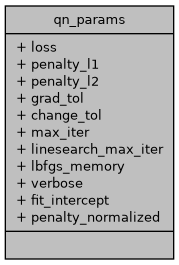#include <qn.h>

Public Attributes | |
| qn_loss_type | loss |
| double | penalty_l1 |
| double | penalty_l2 |
| double | grad_tol |
| double | change_tol |
| int | max_iter |
| int | linesearch_max_iter |
| int | lbfgs_memory |
| int | verbose |
| bool | fit_intercept |
| bool | penalty_normalized |
Member Data Documentation
◆ change_tol
| double qn_params::change_tol |
Convergence criteria: the threshold on the function change.
◆ fit_intercept
| bool qn_params::fit_intercept |
Whether to fit the bias term.
◆ grad_tol
| double qn_params::grad_tol |
Convergence criteria: the threshold on the gradient.
◆ lbfgs_memory
| int qn_params::lbfgs_memory |
Number of vectors approximating the hessian (l-bfgs).
◆ linesearch_max_iter
| int qn_params::linesearch_max_iter |
Maximum number of linesearch (inner loop) iterations.
◆ loss
| qn_loss_type qn_params::loss |
Loss type.
◆ max_iter
| int qn_params::max_iter |
Maximum number of iterations.
◆ penalty_l1
| double qn_params::penalty_l1 |
Regularization: L1 component.
◆ penalty_l2
| double qn_params::penalty_l2 |
Regularization: L2 component.
◆ penalty_normalized
| bool qn_params::penalty_normalized |
Whether to divide the L1 and L2 regularization parameters by the sample size.
Note, the defined QN loss functions normally are scaled for the sample size, e.g. the average across the data rows is calculated. Enabling penalty_normalized makes this solver's behavior compatible to those solvers, which do not scale the loss functions (like sklearn.LogisticRegression()).
◆ verbose
| int qn_params::verbose |
Triggers extra output when greater than zero.
The documentation for this struct was generated from the following file:
- include/cuml/linear_model/qn.h